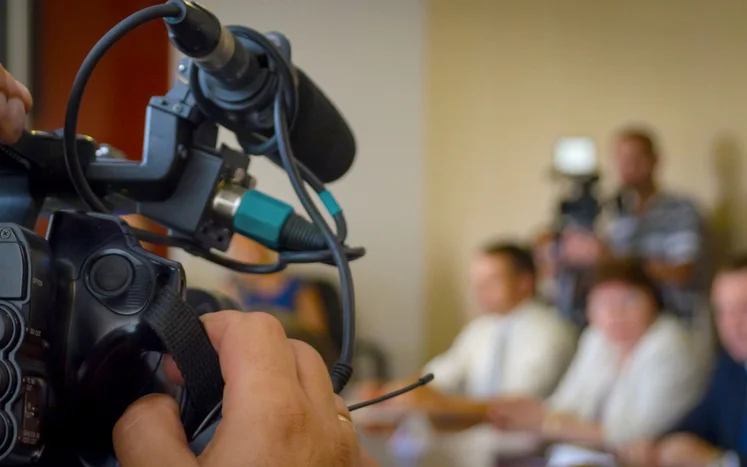Comprehensive Legal Videography for Depositions.
Comprehensive Legal Videography for Depositions.
Blog Article
The Role of Legal Videography in Depositions and Tests
Legal videography has arised as a necessary device in both depositions and trials, providing a multifaceted method to documenting witness testaments. As legal experts increasingly acknowledge its value, it motivates a much deeper exam of how these aesthetic documents can influence juror understandings and test end results.

Value of Lawful Videography
Lawful videography plays an essential function in the documents and discussion of depositions and trials. This customized field integrates technological skills with legal expertise to create a trustworthy record of proceedings that can considerably affect case end results. The aesthetic facet of lawful videography boosts the understanding of witness testimony, allowing jurors and judges to observe not just the spoken words but likewise the disposition, feelings, and body movement of the witnesses.
Furthermore, legal videography supplies an unbiased account of events, minimizing the potential for misinterpretation that can accompany written records alone. This visual documents acts as a critical tool during trial presentations, promoting a more clear and even more influential story for both complainants and offenders. Moreover, the ability to replay video clip sections during court proceedings makes it possible for legal teams to highlight bottom lines, reinforcing their arguments properly.
The value of lawful videography prolongs beyond the courtroom; it likewise plays a vital role in maintaining proof for future recommendation, whether for appeals or more lawsuit. Because of this, its integration right into the legal process is vital for guaranteeing a reasonable and accurate representation of the facts, ultimately adding to the pursuit of justice.

Refine of Legal Videography
While capturing the nuances of depositions and trials, the procedure of legal videography includes a number of important actions that make certain high-quality, precise recordings. At first, a professional legal videographer prepares by evaluating the case products and recognizing the particular demands of the deposition or test. This preparation includes acquainting themselves with the individuals and the context, which helps in capturing important information.
On the day of the recording, the videographer establishes the required tools, which usually consists of high-definition electronic cameras, microphones, and proper illumination. Ensuring optimal angles and sound quality is vital, as it directly influences the efficiency of the recording. The videographer interacts with attorneys and individuals to develop protocols, ensuring that everybody comprehends the recording process.
Throughout the deposition or trial, the videographer diligently videotapes the process, paying very close attention to both verbal and non-verbal cues. This consists of recording the demeanor and responses of witnesses and lawyers. After the session wraps up, the videographer might edit the video footage for clearness and conformity with lawful standards, creating a last product that properly shows the proceedings for future reference and usage in lawful contexts.
Advantages in Depositions
The consolidation of videography in depositions offers various benefits that improve the overall procedure of gathering evidence. One main benefit is the capacity have a peek at these guys to capture witness statements with visual and acoustic integrity, giving an extra exact depiction of the witness's attitude, tone, and body movement. This multidimensional approach enables lawyers and juries to evaluate trustworthiness better than standard written transcripts alone.
Furthermore, videographed depositions work as a powerful device for preserving testimony. Needs to a witness come to be inaccessible for trial, their videotaped deposition can be played in court, making certain that their evidence stays this page available and relevant. This facet significantly reduces the danger of shedding essential info that might influence situation outcomes.

Lastly, videography enhances the general professionalism and trust of the deposition procedure, instilling self-confidence in clients regarding the thoroughness of their legal depiction (legal videography). By leveraging innovation, legal specialists can substantially enhance the effectiveness of depositions
Effect On Trials
In numerous tests, the combination of videography can significantly influence the presentation of evidence and the jury's perception. Lawful videography captures witness testaments and important evidence in a dynamic format, permitting jurors to involve with the product on several levels. This aesthetic part improves the storytelling facet of a test, providing context and psychological vibration that conventional text-based proof may lack.
Additionally, video recordings can function as powerful devices for impeachment throughout interrogation. When inconsistencies occur in between a witness's previous declarations and their court room testament, video clip proof provides an objective reference that can sway jurors' point of views. This immediacy and article source clearness can strengthen the trustworthiness of an event's story while simultaneously weakening opposing arguments.

Future Trends in Legal Videography
As we look towards the future of legal videography, a number of arising trends assure to improve its function within the courtroom. One significant fad is the integration of expert system (AI) in video clip analysis and editing and enhancing. AI can improve the process of recognizing key moments in taped depositions, allowing attorneys to promptly access relevant material, thus improving efficiency in instance preparation.
In addition, the rise of virtual truth (VR) and enhanced truth (AR) modern technologies is anticipated to change exactly how jurors experience proof. legal videography. By immersing jurors in a simulated setting, these technologies can supply a more profound understanding of complicated scenarios, bring about more informed deliberations
In addition, the enhancing need for remote depositions, increased by the COVID-19 pandemic, will likely continue. Lawful videographers will require to adjust to brand-new software and platforms to ensure premium recordings in virtual setups.
Lastly, the growing emphasis on data safety will certainly necessitate stricter procedures for storing and sharing video proof. As the legal landscape advances, legal videographers have to stay abreast of these fads to maintain their importance and efficiency in the judicial procedure.
Conclusion
In recap, legal videography offers a crucial feature in the judicial process, boosting the integrity of depositions and trials. As innovation continues to advance, lawful videography is poised to further transform its role within the legal landscape.
Report this page